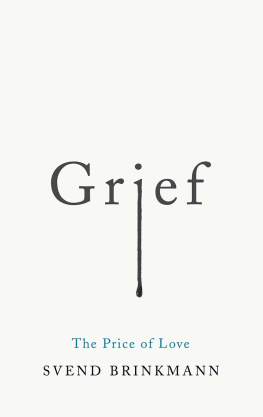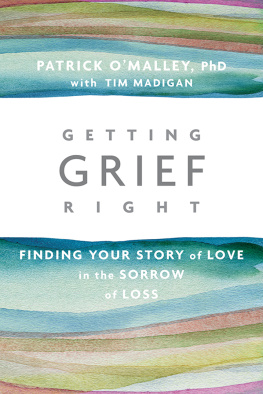
Grief
The Price of Love
Svend Brinkmann
Translated by Tam McTurk
polity
Svend Brinkmann and Klim Publishers
First published in Danish as Det Srgende Dyr, Klim Publishers, 2018
This English edition Polity Press, 2020
Polity Press
65 Bridge Street
Cambridge CB2 1UR, UK
Polity Press
101 Station Landing
Suite 300
Medford, MA 02155, USA
All rights reserved. Except for the quotation of short passages for the purpose of criticism and review, no part of this publication may be reproduced, stored in a retrieval system or transmitted, in any form or by any means, electronic, mechanical, photocopying, recording or otherwise, without the prior permission of the publisher.
ISBN-13: 978-1-5095-4125-6
A catalogue record for this book is available from the British Library.
Library of Congress Cataloging-in-Publication Data
Names: Brinkmann, Svend, author. | McTurk, Tam, translator.
Title: Grief : the price of love / Svend Brinkmann ; translated by Tam McTurk.
Other titles: Srgende dyr. English
Description: English edition. | Cambridge ; Medford, MA : Polity, 2020. | Translated from Danish. | Summary: Brinkmann yet again offers a brilliant and illuminating account of one of the core components of human experience - grief -- Provided by publisher.
Identifiers: LCCN 2019041174 (print) | LCCN 2019041175 (ebook) | ISBN 9781509541232 | ISBN 9781509541249 (pb) | ISBN 9781509541256 (epub)
Subjects: LCSH: Grief. | Bereavement--Psychological aspects.
Classification: LCC BF575.G7 B7367 2020 (print) | LCC BF575.G7 (ebook) | DDC 155.9/37--dc23
LC record available at https://lccn.loc.gov/2019041174
LC ebook record available at https://lccn.loc.gov/2019041175
The publisher has used its best endeavours to ensure that the URLs for external websites referred to in this book are correct and active at the time of going to press. However, the publisher has no responsibility for the websites and can make no guarantee that a site will remain live or that the content is or will remain appropriate.
Every effort has been made to trace all copyright holders, but if any have been overlooked the publisher will be pleased to include any necessary credits in any subsequent reprint or edition.
For further information on Polity, visit our website: politybooks.com
Preface
This is a book about grief. It is not a treatment manual, personal account or self-help reference work for moving on. There are enough of those out there already, reflecting the widespread public interest in the phenomenon and the advent of complicated grief as a clinical diagnosis. Any number of people will willingly offer their help to those who have suffered the loss of a loved one. Once deemed personal and private, the preserve of bereaved individuals and groups, grief has become a matter for professionals, something to be treated with medicine and addressed by institutions. Since almost everybody encounters the phenomenon at some point or other, the potential market for diagnosis and treatment is huge. Nonetheless, the focus of this book is not on intervention, therapy or other forms of treatment. Instead, it explores the very essence of grief its phenomenology. It seeks to analyse the fundamental nature of grief as a universal human condition, while recognising that it varies enormously depending on factors such as time and culture. The aim is to temper the debate about the medicalisation and pathologisation of grief, which is addressed in the final chapter.
The book has emerged from an ongoing research project, The Culture of Grief, which has been generously funded by the Obel Family Foundation. The project looks at how individuals experience grief, but also at collective mourning and how it relates to contemporary culture. Its many sub-projects and indeed, this book focus solely on the grief caused by bereavement. Although it is valid to discuss grief more broadly, as a response to divorce, illness, redundancy or other traumatic experiences, it would be beyond the scope of this book partly because the new psychiatric diagnoses refer specifically to grief in response to death, but also because it is important not to blur the focus. The book does not look at specific types of grief, but approaches it as a generic phenomenon, something about which universal points can be made. It seeks to analyse the general features of the phenomenon and its impact on both individuals and society. The premise that it is possible to approach grief as a generic phenomenon is, of course, open to challenge. Some might deny any similarity between, for example, a parent losing a child and the death of a grandparent. By adopting a phenomenological approach examining the phenomenon in terms of how it is experienced by humans the book attempts to uncover the common features in griefs many manifestations. The ultimate success of that endeavour will depend not just on the analyses included here, but also on other scholars adopting a similar approach.
I would like to thank my friends at Klim for embracing the original idea of publishing a book about grief especially Michael Nonboe and Camilla Rohde Sndergaard, who have been a huge help with my scientific work for many years. I would also like to thank Louise Knight in particular for publishing the English version, and Tam McTurk for yet another masterful translation. I also owe a huge debt of gratitude to my colleagues from The Culture of Grief project for discussing the themes covered in the book: Ester Holte Kofod, Ditte Winther-Lindqvist, Allan Kster, Brady Wagoner, Ignacio Bresc, Luca Tateo, Anne Suhr, Mikkel Krause Frantzen, Peter Clement Lund, Alfred Bordado Skld and Anders Petersen Ester, Allan and Anders in particular for their help in reviewing the manuscript. I am grateful to the whole team at Polity for all their help with the English version of the book. Finally, I would like to thank the Obel Family Foundation for so generously funding the five-year Culture of Grief project, especially Britta Graae, with whom I enjoy an excellent working relationship in my capacity as head of research.
The theoretical ideas in this book were first explored in articles in the journals Mortality (The body in grief), Culture & Psychology (Grief as an extended emotion, co-authored by Ester Holte Kofod), Theory & Psychology (The grieving animal: Grief as a foundational emotion), Nordic Psychology (Could grief be a mental disorder?), Qualitative Inquiry (The presence of grief, co-authored by nine other scientists from The Culture of Grief) and Integrative Psychological and Behavioral Science (General psychological implications of the human capacity for grief). I would like to take this opportunity to thank the journal editors and peer reviewers for all of their work.
It is impossible to relate to grief purely analytically as a phenomenon to consider objectively, from a safe distance because as adult human beings we have all, in one way or another, had personal experience of loss and grief. In February 2017, not long into The Culture of Grief project, I lost my father. Ever since, I have had a peculiarly dualistic view of my own grief both from the inside, by dint of the relationship between father and son, and from the outside, by virtue of my gradual accumulation of scientific, theoretical and empirical knowledge about the phenomenon. I have attempted to relate critically to the scientific theories through the lens of my personal experience, but I also believe that the research has helped me process my own loss. I would like to dedicate this book to the memory of my father, T.A. Christensen.
Next page















